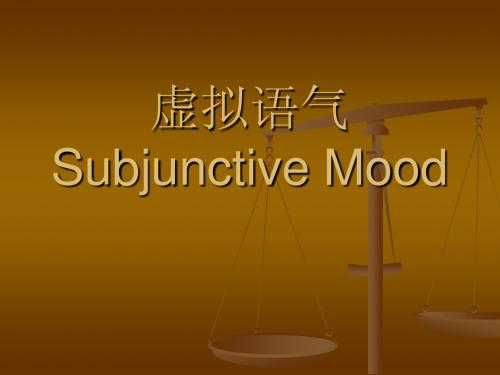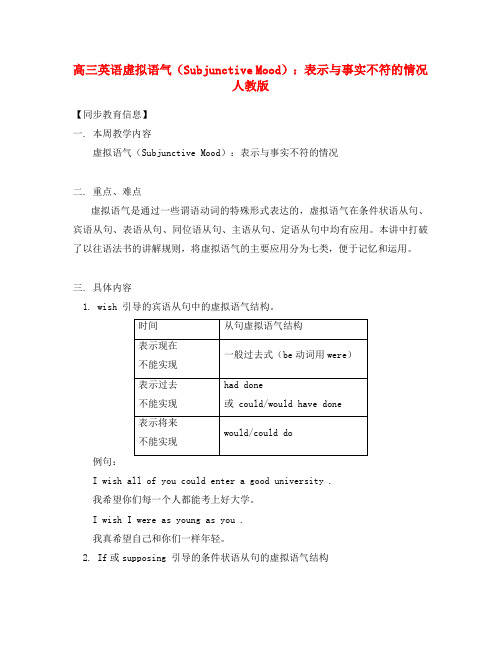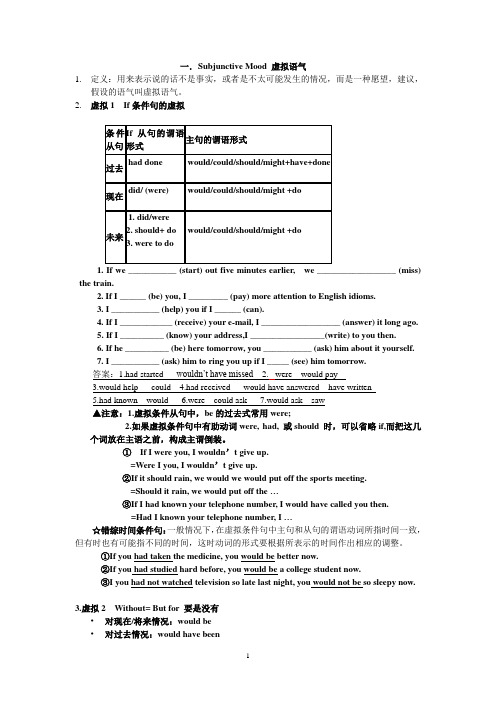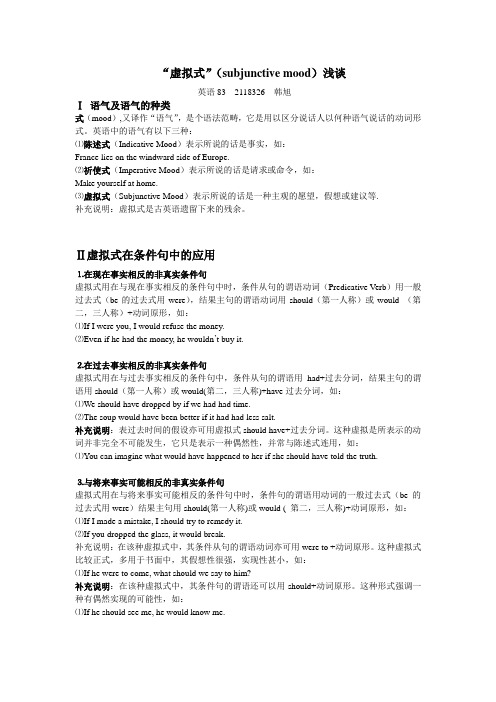新编英语语法教程Subjunctive Mood
- 格式:ppt
- 大小:213.50 KB
- 文档页数:33




高三英语虚拟语气(Subjunctive Mood):表示与事实不符的情况人教版【同步教育信息】一. 本周教学内容虚拟语气(Subjunctive Mood):表示与事实不符的情况二. 重点、难点虚拟语气是通过一些谓语动词的特殊形式表达的,虚拟语气在条件状语从句、宾语从句、表语从句、同位语从句、主语从句、定语从句中均有应用。
本讲中打破了以往语法书的讲解规则,将虚拟语气的主要应用分为七类,便于记忆和运用。
三. 具体内容1. wish 引导的宾语从句中的虚拟语气结构。
例句:I wish all of you could enter a good university .我希望你们每一个人都能考上好大学。
I wish I were as young as you .我真希望自己和你们一样年轻。
2. If或supposing 引导的条件状语从句的虚拟语气结构注:(1)从句和主句可以根据时间选择不同的虚拟语气结构(2)从句中的虚拟语气结构可以使用倒装,去掉if,用were , had , should 代替if。
(3)其他由as if , as though , even if , even though , if only引导的状语从句或表语从句中,都使用由if引导的从句虚拟语气结构。
例句:If you had prepared for the exam well , you wouldn’t have failed .如果你好好复习,你就不会不及格了。
Supposing you had prepared for the exam well , you wouldn’t regret now .如果你好好复习了,现在就不会后悔。
Were I you , I wouldn’t waste the time .如果我是你,我就不浪费时间。
He looks as if he had known the secret.他看上去好像知道了那个秘密。

一.S ubjunctive Mood 虚拟语气1.定义:用来表示说的话不是事实,或者是不太可能发生的情况,而是一种愿望,建议,假设的语气叫虚拟语气。
2.虚拟1 If条件句的虚拟1. If we ___________ (start) out five minutes earlier, we __________________ (miss) the train.2. If I ______ (be) you, I _________ (pay) more attention to English idioms.3. I ___________ (help) you if I ______ (can).4. If I ____________ (receive) your e-mail, I __________________ (answer) it long ago.5. If I __________ (know) your address,I _________________(write) to you then.6. If he __________ (be) here tomorrow, you ___________ (ask) him about it yourself.7. I ___________ (ask) him to ring you up if I _____ (see) him tomorrow.答案:1.had started wouldn’t have missed 2.were would pay3.would help could4.had received would have answered have written5.had known would6.were could ask7.would ask saw▲注意:1.虚拟条件从句中,be的过去式常用were;2.如果虚拟条件句中有助动词were, had, 或should 时,可以省略if,而把这几个词放在主语之前,构成主谓倒装。

“虚拟式”(subjunctive mood)浅谈英语83 2118326 韩旭Ⅰ语气及语气的种类式(mood),又译作“语气”,是个语法范畴,它是用以区分说话人以何种语气说话的动词形式。
英语中的语气有以下三种:⑴陈述式(Indicative Mood)表示所说的话是事实,如:France lies on the windward side of Europe.⑵祈使式(Imperative Mood)表示所说的话是请求或命令,如:Make yourself at home.⑶虚拟式(Subjunctive Mood)表示所说的话是一种主观的愿望,假想或建议等.补充说明:虚拟式是古英语遗留下来的残余。
Ⅱ虚拟式在条件句中的应用⒈在现在事实相反的非真实条件句虚拟式用在与现在事实相反的条件句中时,条件从句的谓语动词(Predicative Verb)用一般过去式(be的过去式用were),结果主句的谓语动词用should(第一人称)或would (第二,三人称)+动词原形,如:⑴If I were you, I would refuse the money.⑵Even if he had the money, he wouldn’t buy it.⒉在过去事实相反的非真实条件句虚拟式用在与过去事实相反的条件句中,条件从句的谓语用had+过去分词,结果主句的谓语用should(第一人称)或would(第二,三人称)+have过去分词,如:⑴We should have dropped by if we had had time.⑵The soup would have been better if it had had less salt.补充说明:表过去时间的假设亦可用虚拟式should have+过去分词。
这种虚拟是所表示的动词并非完全不可能发生,它只是表示一种偶然性,并常与陈述式连用,如:⑴You can imagine what would have happened to her if she should have told the truth.⒊与将来事实可能相反的非真实条件句虚拟式用在与将来事实可能相反的条件句中时,条件句的谓语用动词的一般过去式(be的过去式用were)结果主句用should(第一人称)或would ( 第二,三人称)+动词原形,如:⑴If I made a mistake, I should try to remedy it.⑵If you dropped the glass, it would break.补充说明:在该种虚拟式中,其条件从句的谓语动词亦可用were to +动词原形。
英语《虚拟语气》语法知识总结归纳虚拟语气(Subjunctive mood)是英语中一种特殊的语气形式,用于表示说话人的假设、愿望、建议、要求、命令等非真实情况。
虚拟语气在句子中通常与动词的调整和语法结构上的变化相关。
以下是对虚拟语气的语法知识的总结归纳:1.条件句中的虚拟语气:1.1 条件句中表示对现在的假设:使用虚拟语气的一般公式是:if + 主语 + 过去式,主句使用would/could/should/might + 动词原形。
例如:- If I were you, I would go to the meeting.(如果我是你,我会去开会。
)注意,这里的"were"是一个特殊的虚拟语气形式,用于所有人称和数。
- If she had studied harder, she might have passed the exam.(如果她努力学习,她可能会通过考试。
)1.2 条件句中表示对过去的假设:使用虚拟语气的一般公式是:if + 主语 + 过去完成时,主句使用would/could/should/might + have + 过去分词。
例如:- If I had known it, I would have told you.(如果我知道了,我会告诉你的。
)- If she had arrived earlier, she might have caught the bus.(如果她早点到,她可能会赶上公共汽车。
)2.虚拟条件句中的特殊情况:2.1 在虚拟条件句中表示命令、建议时,主句中的动词可以使用动词原形(而不是would/could/should/might + 动词原形)。
例如:- If you have any questions, please let me know.(如果你有任何问题,请告诉我。
)- If I were you, I would take a break.(如果我是你,我会休息一下。
Subjunctive Mood(Ⅰ)虚拟语气: 英语的动词一般带有三种不同的语气:陈述语气、祈使语气和虚拟语气。
一、陈述语气(The Indicative Mood):用来陈述一个事实或提出一种看法,有肯定、否定、疑问、感叹等形式。
eg. I like English.二、祈使语气(The Imperative Mood):用来表示请求、邀请、命令、警告或劝告等。
eg. Open the door, please. Don’t play in the street.三、虚拟语气(The Subjunctive Mood):表示说话人所说的话不是事实,而是一种假设、愿望、怀疑或推测。
它通过谓语动词的特殊形式来表示。
虚拟语气主要用于if条件状语从句,也可用于主语从句、表语从句、宾语从句等。
虚拟语气在if条件状语从句中的用法含义动词形式例句If从句主句与事实相反现在一般过去时Would/should/could/might+动词原形If we had enough money,wewould buy a computey.将来一般过去时If it rained tomorrow, we’dstay at home.If I were to ask, wouldyou help me?If it should be necessary,I could come at six.were to+动词原形should+动词原形过去had +过去分词Would/should/could/might have+过去分词If I had worked harder atschool, I would have got abetter job.1、表示与现在事实相反的假设,从句谓语动词用一般过去时(be用were),主句谓语动词用would, should, could, might+动词原形eg. ①If I were you, I would go to see the film.②What would you do if you were in my position?2、表示与将来事实相反的假设,从句谓语动词用一般过去时(be用were)、were to do或should do,主句谓语动词用would, should, could, might+动词原形eg. ①If it were to rain tomorrow, they would not go out.②If the bad weather were to continue, we would have to call off the match.3、表示与过去事实相反的假设,从句谓语动词用过去完成时,主句谓语动词用would, should, could, might+现在完成时eg. ①If you had left a bit earlier, you could have caught the train.②If you had taken the doctor’s advice, you would have recovered.虚拟语气用在wish后的宾语从句中含义动词形式例句针对现状表达愿望(与事实相反)一般过去时I wish I had a little lab ofmy own.对过去发生事情的表示遗憾或后悔过去完成时I wish you had let meknown earlier.针对将来表达愿望(虽然可能性极小,但有实现的可能)Would/ could/ might+动词原形I wish you wouldn’t smokeany more.I wish he could come tomorrow.1、表示现在不能实现的愿望,从句谓语动词用一般过去式(be用were)eg. ①I wish it were spring all the year round.②He wishes he could paint as well as a professional artist.2、表示对过去事情的遗憾,从句谓语动词用过去完成时或could+现在完成时eg. I wish I had been with you yesterday.3、表示对将来的愿望时,从句谓语动词用would/could/ might +动词原形eg. We wish the rain would stop.※1、虚拟的条件有时可以不用条件从句表示,而是通过某些介词短语、副词或上下文等来表达,这就是含蓄条件句。
The Subjunctive Mood (动词的虚拟语气)1.概说语气(mood)是动词的一种特殊形式,用来表示说话人对所谈内容所持的态度。
按说话人所持的不同态度,英语动词可有三种不同语气,1)陈述语气(用于陈述事实);2)祈使语气(用语提出命令、请求等);3)虚拟语气(用于表示主观愿望、假设、怀疑、推测或与现实相反、不能实现、无把握实现的假设条件等)。
如:They are good doctors of the Bethune type.(陈述语气)他们是白求恩式的好医生。
Be good doctors of the Bethune type. (祈使语气) 要做白求恩式的好医生。
I wish I were a good doctor of Bethune type. (虚拟语气)但愿我是个医生。
上面三句例句中动词be分别使用了are、be、were 这三种不同形式,以表示陈述、祈使和虚拟等三种语气。
2.虚拟语气在条件句中的应用:所谓条件句就是包含条件、假设的句子。
按照其意义的不同,可分为两类:1)真实条件句(Sentence of Real Condition)假设的条件有可能发生和实现,谓语动词用陈述语气。
如:If I have time, I’ll go to see you.We will go on a picnic unless it rains tomorrow.2) 非真实条件句(Sentence of Unreal Condition)假设的条件纯属设想、推测,不可能实现或与实际情况相反,谓语动词用虚拟语气。
a. 用于表示与现在事实相反的条件从句中动词用过去时(动词be一律用were)表示,而主句中的动词用“should / would +动词原形”来表示. 如:If he worked hard, he would learn more.If he were here, he would help me with my work.If I were given two weeks’ holiday, I would liketo go to Beijing.What would you do if you saw a house on fire?b. 用于表示与将来事实相反的条件从句中动词用“should(或were to)+动词原形”这一形式,主句中动词用法同上。